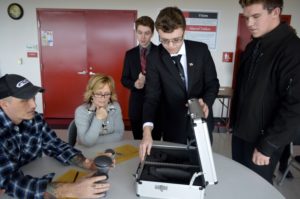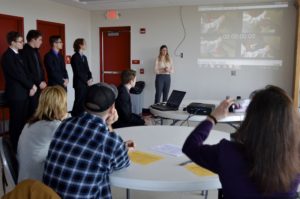SPS teams from Charleroi and Bentworth bring actionable ideas to DMI
Students who participated in our Student Powered Solutions project with DMI Companies not only came up with actionable ideas, they came away realizing they’d gained valuable skills.
Teams from Bentworth and Charleroi Area high schools approached a problem DMI posed from different angles. Bentworth came up with recommendations for reducing a troublesome waste product for the company while Charleroi offered ideas for recycling it.
They presented their findings in January to educators from both schools, SPS staffers and representatives from DMI’s technical staff.
The challenge DMI gave the teams was finding better ways to reduce or dispose of expanded polyurethane foam that overspills their production line as polyurethane sealing rings are mechanically applied to the ends of the HVAC duct tubes the company produces. Currently, DMI trucks the bulky material to a waste-to-energy plant, but it’s costly to do so.
Among ideas that intrigued and impressed DMI’s technical staff were Bentworth’s recommendation to cool the reactants used to make the polyurethane before they go into the manufacturing process where they’re combined as they’re applied. Cooling the reactants appeared to slow polyurethane production, therefore reducing overspill.
Sustainability Manager Lisa Pavan also was enthused about some recycling possibilities such as shredding the foam to make packing materials for commercial shippers.
Although the possibility had occurred to her, she’d originally dismissed it, thinking the material still would likely end up in landfills after shipping boxes were unpacked. DMI is committed to being an environmentally conscious company and strives to find creative solutions to reduce and/or repurpose its waste material.
But Jordan, a young woman on Charleroi’s team, suggested that DMI seek a shipping partner willing to provide package recipients with pre-paid labels for sending the material to the waste-to-energy facility where DMI sends it.
“It would be so easy, I’m just amazed that I didn’t think of it,” said Pavan.
 Pavan also liked a stadium seat cushion that the kids fabricated with Charleroi’s logo and filled with the foam. DMI could use cushions with its own logo as promotional item, she said, or provide the foam to companies that make stadium cushions.
Pavan also liked a stadium seat cushion that the kids fabricated with Charleroi’s logo and filled with the foam. DMI could use cushions with its own logo as promotional item, she said, or provide the foam to companies that make stadium cushions.
Another idea that she said bears further research is using shredded foam as playground mulch. A Charleroi team member has agreed to test the material outdoors to see how well it holds up to the elements.
Students on both teams said the projects forced them to focus on soft skills like communication. Building soft skills is an SPS priority because employers complain that young hires often haven’t adequately developed them.
“We definitely needed communication,” said Colton, a Charleroi team member. Among other reasons, he said the project required team members not only to exchange information with each other, but also talk to adults in and outside their school. In researching ideas, they reached out to companies that could provide supplies DMI might need to execute them.
At Bentworth, Chris said his team’s collaboration necessitated the use of email, joking that the Snapchat, a medium that seems to have supplanted email among teens, probably wouldn’t be suited to exchanges of logs and other project communications. The email exchanges made it more “like it would be in the business world,” Chris said.
Jordan said they found Project-Based Learning very different than most classroom assignments because “there are no wrong answers” and there are no pre-established rules for finding ideas that may work.
Said one another student: “It’s really different from a normal classroom experience where the teacher structures the assignment…You’re kind of on your own and you have to figure things out.”






